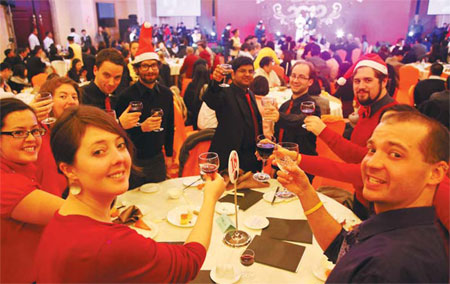It's party time!
Updated: 2012-01-04 13:53
By Xie Yu (China Daily)
|
|||||||||||
 |
|
Expats working in Tianjin enjoy a Christmas party in a hotel. The party business is booming in big cities. [Photo/China Daily ] |
Back-to-back holidays mean big bucks for companies that provide goods and services for year-end celebrations. Xie Yu reports from Shanghai.
Back-to-back year-end holidays boost party stores' and catering businesses' sales, and create cash flows for big restaurants and luxury hotels in Shanghai. Yang Zhenhua is having his busiest days of the year with Christmas, New Year and Spring Festival. His small party store in Shanghai's Biyun international community is crammed with balloons, candles, streamers, banners, tableware, toys and gifts.
"Here we go," the 34-year-old says, climbing a ladder to retrieve a bright yellow papier-mache rooster.
"It's called a pinata. You fill it with candies and chocolates, and then hang it high in the party room. You break it with a stick, and candies shower down like rain. Kids just love it."
The Shanghai native gave up his lucrative interior decoration business and opened the JaJaJa Party Shop in 2009. His business has been growing vigorously, and he plans to open a second party store in western Shanghai.
"From late October until the following February are the golden days," Yang says.
"Thanksgiving, Christmas, New Year, the Chinese lunar new year ... It's the party season."
He can earn more than 200,000 yuan ($32,250) per holiday, he says.
Yang has also taken his store into cyberspace and his online sales are booming.
Items available in JaJaJa cost between 6 yuan and hundreds of yuan. The company also offers party services, including venue decoration, entertainment and food preparation. A private party costs from 200 yuan to tens of thousands yuan.
"It depends on the customers' requirements," Yang says.
"If you just want simple party decorations, we charge only 200 to 300 yuan. But if the customer wants more entertainment and food, it may cost much more."
Yang and his colleagues just organized a private party with a "Lightening McQueen" (a racecar who is the hero of the computer-generated film Cars) theme for an Indian client.
JaJaJa customized a huge model of Lightening McQueen and displayed it in the party venue. The company also managed to book a 3D cake and more than 100 cupcakes shaped like the car.
Tents and flowers were set up outdoors. JaJaJa also invited local bands and performers from Shanghai's circus and acrobatics troupe.
The company charged 80,000 yuan for the party.
"To arrange such a party takes a great deal of time and energy," Yang says.
"Some clients wouldn't bother and instead entrust the task to us."
More than 90 percent of Yang's customers are foreigners, because Chinese don't have the same party customs, he says.
According to the Shanghai municipal statistics bureau, the number of registered foreigners living in Shanghai surpassed 150,000 in 2009 and has continued to expand with double-digit growth in recent years.
"Shanghai is so cosmopolitan that more foreigners are coming," Yang says.
"And I'm getting more Chinese clients."
As more Chinese people receive better educations and go abroad to study and travel, their lives are becoming partly westernized, Yang says.
"According to my experience, Chinese people are the easiest to get drunk and excited at parties," Yang says.
"They aren't as reserved as they seem."
Yang is optimistic about the future. His hope is to set up national party goods chain, "just like Party City" in the US.
"I believe the market is enormous in China," he says.
SPR Cafe & Bar manager Xi Xi agrees.
The German-style cafe bar started offering beer, coffee and food for parties since 2007. It began offering comprehensive party planning and operation services after seeing the market potential.
"It's obvious that our party catering business has been thriving in the past two years, especially toward the yearend," he says. "I expect the turnover in this sector will increase by 50 percent over last year."
Bigger restaurants, hotels and travel agencies are also enjoying strong seasonal sales.
"You have to make decisions as early as possible, so that we can make reservations as early as possible. Otherwise, there will be no tables at all," says Zhou Wenxiao, marketing specialist with Shanghai Dinning Secretary (SDS), the city's most popular dining reservation hotline.
Restaurant and hotel bookings skyrocket from November to late December, as many companies attach great importance to their annual parties, Zhou says. SDS' business is roaring as it offers meal and hotel room discounts, Zhou says.
SDS offers dinner choices from 100 yuan to more than 1,000 yuan per person, Zhou says.
The mid- to high-level options are the most popular, and turnover has increased by 30 to 40 percent compared to last year, he says. He explains it's difficult to make reservations at some hotels during the period.
Pudong Shangri-La, Shanghai, this year increased the annual party banquet price by 10 percent per person, but reservations for banquets of 600 to 700 people increased remarkably.
"Another good year means another thumping annual party," Philips, Shanghai project manager Garfield Tao says.
"The annual party is an indicator of the company's status quo, and thus is the most effective way to enhance employees' confidence and commitment. And when it comes to China, eating a big meal is vital."
His company booked 70 tables in a grand Shanghai hotel for its annual party.
Last year, in Zhejiang province, Ningbo Yofoto Commodity Co rewarded its best employees with 26 Mercedes-Benz cars and 14 BMWs, each worth an average of 400,000 yuan, at a year-end party.
An official with Yofoto's planning department, who declined to give her name, says her company has "maintained the scale" of its annual party this year but she wouldn't reveal details. Employee rewards are an internal affair that shouldn't be publicized, she says.